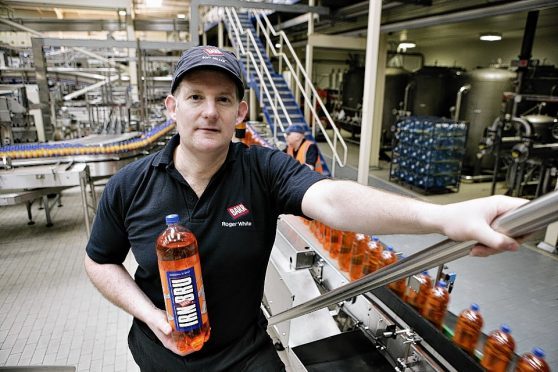Irn-Bru firm A.G. Barr said yesterday it may axe 90 jobs after a 3.6% slide in revenue during the six months to July 30.
But the company also said it achieved a “solid” first half performance in a “volatile and deflationary” market.
Warning of further challenges ahead, it said it expected the recent fall in the value of sterling, if sustained, to lead to higher input costs across a number of ingredients.
This is expected to add up to £4million to overheads next year, although the Cumbernauld-based firm said it was taking action to offset extra costs wherever possible.
Pre-tax profits for the business rose to £21.1million, from £16.9million a year earlier, though the latest figure included a one-off £4.1million credit linked to the firm closing its final salary pension scheme to future accruals.
Total revenue for the latest period came in at £125.6million, down from £130.3million previously, as like-for-like sales slid by 2.8%.
The potential job losses – affecting about 10% of the workforce – are part of a restructuring forming part of the firm’s Fit for the Future business improvement programme .
Chief executive Roger White said: “We have delivered a solid first half performance, maintaining market share and improving our operating margin, with a slight improvement in our pre-exceptional profit versus the prior year.
“This is despite continued price deflation in the UK market, a challenging customer and consumer environment as well as poor weather in the important early summer months leading up to the end of the reporting period.
“Market conditions remain volatile and somewhat unpredictable, however, assuming a strong trading performance in the key festive period we remain on track to deliver profit – before tax and exceptionals – slightly ahead of last year.”
Barr said the decision to close the final salary pension scheme to future accruals was prompted by a growing deficit, with the year-on-year shortfall nearly doubling to £25million by July.
And it repeated concerns about the UK Government’s proposed soft drinks sugar tax, saying it would be a “punitive and unnecessary distortion” to competition in the UK market and also complicated, expensive and difficult to implement.
The firm added: “Our aggressive reformulation and sugar reduction actions, along with our innovation and marketing, will drive sustained and significant improvements in the balance and choice offered across our portfolio.
“We believe our positive actions and sugar reduction progress, along with those of many of our competitors within the soft drinks industry, make the implementation of a soft drinks only sugar tax an unnecessary measure in the context of government health policy objectives.”
